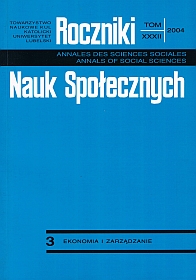Wpływ zachowań wyborcy na zakres czasowy marketingu politycznego
Abstrakt
Despite numerous publications on the subject, there is still no agreement as to the sense of political marketing, its nature and aims. The article `The Impact of Voter Behaviour on the Time Span of Political Marketing' touches upon the fundamental issue of the essence of marketing activities on a political market. The author seeks to answer the question: Should (in the light of efficiency criterion) political marketing be only one of manifestations of a party's electoral activity, or should all party's activity - both between and during campaigns - be based on a long-term marketing strategy?
The starting point is the analysis of theoretical models of voter behaviour supported with an empirical research carried out by the author from September 1997 to September 2001 in Poland. The conclusion of this analysis is that reducing marketing activities only to campaign communications curtails its efficiency. Therefore, all marketing activities should be based on a long-term marketing strategy which covers a party's activity both between and during election campaigns.
Bibliografia
Butler P., Collins N. (1999), A Conceptual Framework for Political Marketing, w: B. I. Newman (Ed.), Handbook of Political Marketing, Thousands Oaks–London– New Delhi: SAGE Publ., s. 55-72.
Campbell A., Converse P. E., Miller W. E., Strokes D. E. (1960), The American Voter, New York: Wyd. John Wiley.
Cwalina W. (2000), Telewizyjna reklama polityczna, Lublin: TN KUL.
Downs A. (1957), An Economic Theory of Democracy, New York: Harper & Row Publ.
Drzycimski A. (red.) (2000), Komunikatorzy, Warszawa–Bydgoszcz: Oficyna Wydawnicza Branta.
Holbrook T. M. (1996), Do Campaigns Matter, Thousands Oak–London–New Delhi: SAGE Publ.
Kavanagh D. (1997), Election Campaining: The New Marketing of Politics, Oxford: Blackwell Publ. LTD.
Key V. O. (1966), The Responsible Electorate, Cambridge, MA: Belknap.
Korzeniowski K. (1999), Psychospołeczne uwarunkowania zachowań konsumenckich, w: K.Skarżyńska (red.), Psychologia polityczna, Poznań: Wyd. Zysk i S-ka, s.197-217.
Kotler P., Kotler N. (1999), Political Marketing. Generating Effective Candidates, Campaign, and Causes, w: B. I. Newman (Ed.), Handbook of Political Marketing, Thousands Oaks–London–New Delhi: Sage Publ., s. 3-18.
Lazarsfeld P., Berelson B., Gaudet H. (1944), The People's Choice, New York: Duell, Sloan & Pearce.
Maarek P. J. (1995), Political Marketing and Communication, Surrey, UK: John Libbey & Co, Guildford.
McLeod J. M., Becker L. B. (1981), The Uses and Gratification Approach, w: D.D.Nimmo, K. R. Sanders (Eds.), Handbook of Political Communication, Beverly Hills–London: SAGE Publ., s. 67-100.
Muszyński J. (1999), Marketing polityczny, Warszawa: Wyższa Szkoła Zarządzania i Marketingu.
Newman B. I. (1994), The Marketing of the President, Thousands Oaks–London–New Delhi: Sage Publ.
Newman B. I. (1999), The Mass Marketing of Politics, Thousands Oaks–London–New Delhi: Sage Publ.
Nimmo D. (1999), Political Persuaders, New Brunswick–London: Transaction Publishers.
O'Shaughnessy N. J. (1990), The Phenomenon of Political Marketing, London: The Macmillan Press, LTD.
Pietraś Z. J. (1998), Decydowanie polityczne, Warszawa–Kraków: PWN.
Raciborski J. (1997), Polskie Wybory, Warszawa: Wydawnictwo Naukowe „Scholar”.
Shaw R. (2001), Nowe spojrzenie na marketing, Warszawa: Wyd Studio EMKA.
Solomon M., Bamossy G., Askegaard S. (1999), Consumer Behavior – A European Perspective, New York–London–Toronto: Prentice Hall Europe.
Wiszniowski R. (2000), Marketing wyborczy, Warszawa–Wrocław: PWN.
Copyright (c) 2004 Roczniki Nauk Społecznych

Utwór dostępny jest na licencji Creative Commons Uznanie autorstwa – Użycie niekomercyjne – Bez utworów zależnych 4.0 Międzynarodowe.


